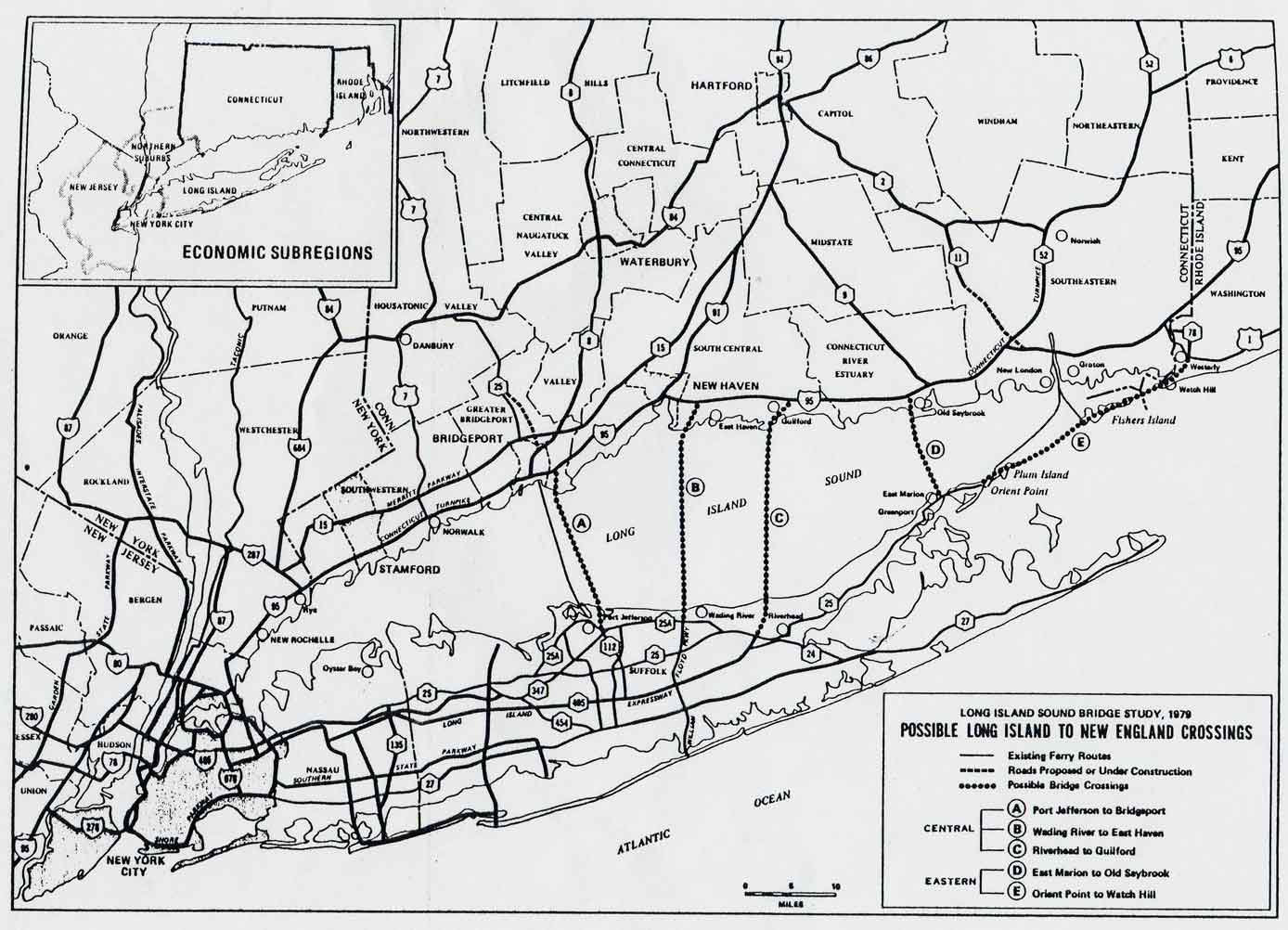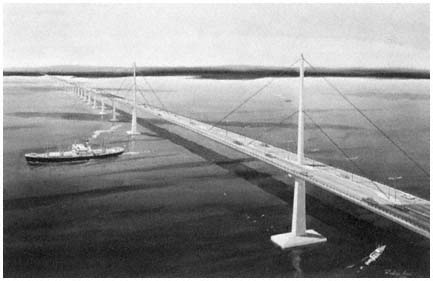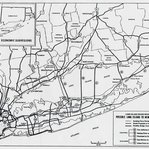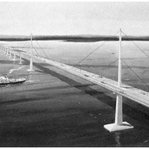A bridge to Connecticut from Long Island sounds like a pipe dream but over eight decades this bridge (or tunnel) to link the two regions has been seriously considered and severely contested. Below we present some of the crazy and historical facts about what has become known as the Long Island Sound link.
Origins
- Over the decades, there have been multiple proposals to connect Long Island to Connecticut, Westchester, NY and even Rhode Island by bridge or tunnel
- The proposal is generally known as the “Long Island Sound link”
- It even has its own Wikipedia page
- In 1938, U.S. Senator from New York Royal Copeland floated the idea of an 18-mile bridge from Orient Point, New York, to Connecticut or Rhode Island
- Back in 1957 there was a proposal to link Long Island from Oyster Bay to Rye, NY and a bridge between Orient Point and Watch Hill, Rhode Island
- The bridge even became a plot point on the Netflix series House of Cards
1960s - NYS Governor Nelson Rockefeller’s Proposal Becomes A Bridge Too Far
- Robert Moses proposed a $100 million bridge from Rye to Oyster Bay in 1965
- In 1967, then New York Governor Nelson Rockefeller signed an act that authorized the construction of the Oyster Bay-Rye Bridge and proposed a 14.6-mile bridge between Port Jefferson and Bridgeport, CT
- Obviously neither of these came to fruition
- A 1973 New York Times story reported that “the New York State Legislature, the legislative boards of Nassau and Westchester Counties, the Connecticut General Assembly, the Governor of Connecticut, the Department of the Interior and the Congress of the United States—all are against the proposed Rye‐Oyster Bay bridge across Long Island Sound. Governor Nelson Rockefeller is for it.”
- In that NYT article it reports that local governments oppose the bridge “on the grounds that Long Island's dwindling wetlands would be seriously diminished, that the requisite network of supporting roads would reduce green areas on both sides of the bridge while increasing the volume of noise and obnoxious auto traffic, and that the recreational value of the Sound itself would be seriously imperiled.” Also, “Congress has refused to authorize the Federal contribution for access roads.”
- The Regional Planning Association (RPA) battled Robert Moses again over his proposal for a bridge across the Long Island Sound in the 1970s
- The RPA proposed a ferry route between Rye and Oyster Bay and Robert Moses proposed a causeway with several bridge spans, which would have tied in with the Cross Westchester Expressway.
1968 Port Jefferson to Bridgeport Bridge Proposal
- In 1968, there was a study on the proposed Port Jefferson-Bridgeport Bridge - it would span 14.6 miles span and include and cost $368.3 million
- The proposal included a new expressway running North/South on Long Island from Port Jefferson to Nicolls Road in Centereach
- In 1971, the NYSDOT commissioned a study of alternative bridge crossings and ruled out five alternative locations between Suffolk County, Connecticut and Rhode Island - it favored construction of a Nassau-to-Westchester span

Late 1970s Revival - Shoreham to New Haven, CT
- Moving the bridge proposal 12 miles east of Port Jefferson to Shoreham a new bridge crossing was proposed
- Newsday ran articles in 1978 assessing the proposal including a seaport in the Shoreham-Wading River area and an airport for international freight at Calverton
- The span would be a four-lane roadway of 19.3 miles
- The cost in 1971 was estimated to be $565 million
- By 1979, that cost skyrocketed to an estimated $1.4 billion due to inflation
- A 1979 Long Island Sound Bridge Study conducted by the NYSDOT estimated that the Shoreham-New Haven Bridge would carry an average of 15,500 vehicles per day with a $6 toll each way
- In Suffolk County, the bridge would connect directly with William Floyd Parkway - designed to carry 57,000 vehicles per day
- At the time it carried about 25,000 vehicles per day
- New York State would take over William Floyd Parkway and create a 4-lane expressway between NY 25A and the Long Island Expressway (I-495) - possibly to Sunrise Highway in Shirley
- Contentious hearings were held with opinions split on the proposed bridge
Modern Proposals - Reconnecting With an Old Idea
- As recently as 2016, former New York Governor Andrew Cuomo said that he wanted to study whether a tunnel across the Long Island Sound would be feasible. "I want to do a really thorough feasibility study," Cuomo is quoted as saying. "I think we can build a tunnel from Long Island to either the Bronx, Westchester or Connecticut. It will shave hours and hours from a commutation standpoint."
- In 2018, a Montreal company submitted results of a study on the possibility and cost to build a bridge or tunnel to Connecticut
- The study proposed three crossing points from Long Island: Oyster Bay to Rye, NY, Kings Park to Bridgeport, CT, and Wading River to New Haven, CT
- Oyster Bay to Rye crossing would be 18 miles long and cost $8.5 to $55.4 billion
- Kings Park to Bridgeport crossing would be 30 miles and cost $13 to $31.2 billion
- Wading River to New Haven crossing would be 32 miles and cost $15.8 to $32 billion
- A February 2000 poll by Newsday and News 12-Long Island found that 63% of Long Island residents were in favor of a bridge between Suffolk County and Connecticut
- In 2021, a comprehensive project proposal called North Atlantic Rail included a 16-mile tunnel from Port Jefferson to Connecticut as part of a new high-speed line between New York City and Boston

Rendition of Oyster Bay-Ray Bridge (I-287) across Long Island Sound. Photo by Triborough Bridge and Tunnel Authority.
A Bridge on Rye
- A NYSDOT study in 2000 called the Long Island Transportation Plan 2000 revived the idea of an Oyster Bay-Rye crossing
- Westchester Magazine reported in a 2021 article that in 2008, “Long Island developer Vincent Polimeni put forth the first serious tunnel proposal” from Long Island to Rye, NY
- The proposed tunnel would be 18 miles long - the longest undersea cars-only tunnel in the world - and cost $10 billion
- Polimeni’s plan was to charge a $25 toll to fund the private project
- NYS Governor Andrew Cuomo’s 2016 proposal also included an Oyster Bay-Rye crossing as one route - estimated to cost $8.5 billion for a bridge-only option up to $55.4 billion for a twin-tube, six-lane tunnel-only alternative
- Environmental activists opposed all crossing options
- In 2018, NYS shelved the discussion












